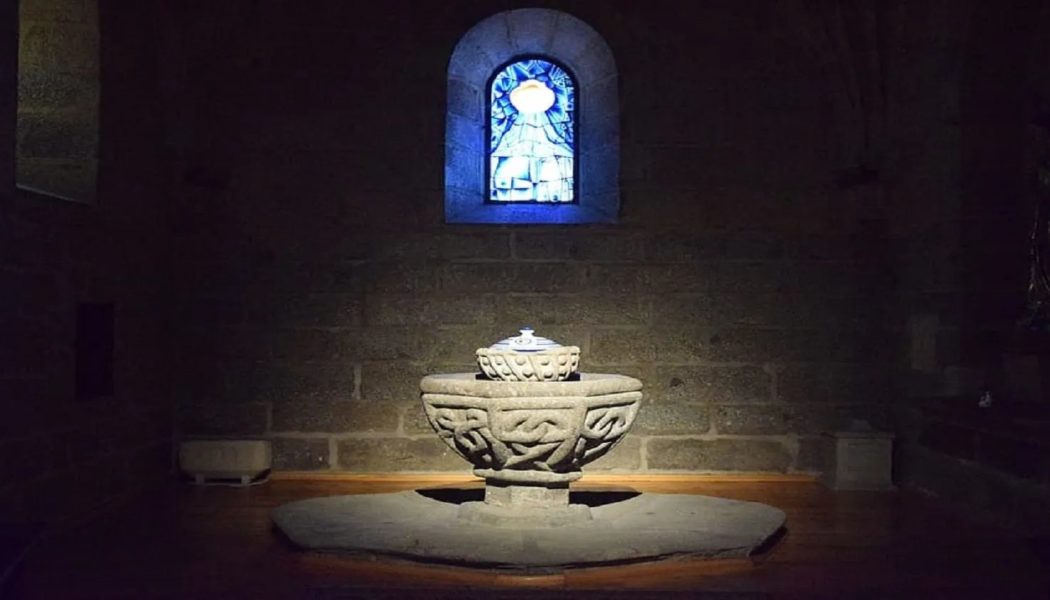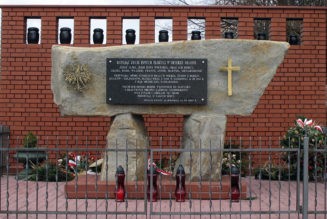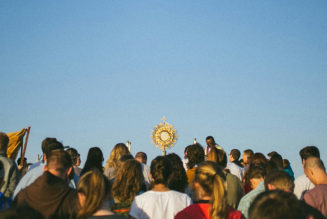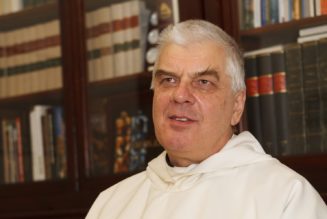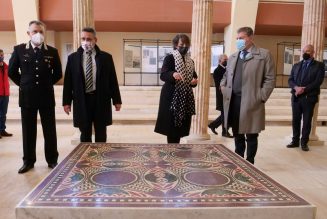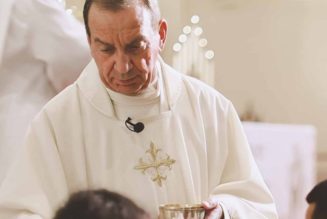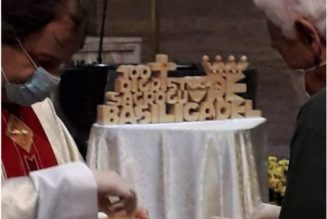
The Gospel for this Sunday is another long one, rich in its language and meaning. Here are a few takeaways for Laetare Sunday, the Fourth Sunday in Ordinary Time Year A.
There was once a tradition to visit your baptismal font on this day, your “mother Church.” That’s appropriate because the readings are all about how that font transformed everything for you.
First, the readings tell us that we are all blind from birth
The Gospel begins, “As Jesus passed by he saw a man blind from birth.” His disciples asked him why the man was blind: Did he sin, or did his parents sin? Neither, says Jesus.
As St. Augustine put it, “The blind man here is the human race. Blindness came upon the first man by reason of sin: and from him we all derive it.”
Jesus says he is the light of the world. We are all born blind to that light — sinners, enemies of God, ready to serve ourselves via the world, the flesh and the devil, instead of our creator.
It can seem unfair that we are all “born already ruined,” as Bob Dylan put it in. But it isn’t. I was born without so many talents I wish I had: I can’t sing, dance or readily understand math. I can’t climb, fight, or play basketball well. Why? Because, if you go back through my ancestral line, you will find that I don’t descend from performers or athletes. I was also born predisposed to sin, and so were you. Why? Because we all descend from a long line of sinners, going back to Adam, and inherited his sin, “not by imitation, but by propagation.”
The good news, though, is that we are all remade by the sacraments, especially baptism.
Next, Jesus approaches the blind man and “spat on the ground and made clay with the saliva, and smeared the clay on his eyes and said to him, ‘Go wash in the Pool of Siloam,’ which means Sent. So he went and washed and came back able to see.”
The earthiness and grittiness of this tells us something about God: He’s not afraid to get his hands dirty. Jesus spits on the ground and rubs the mud in his eyes. It brings two images to mind. First is one of the two creation accounts in Genesis. “Then the Lord God formed man out of the dust of the ground.” Second is the image of baptism, which is referenced elsewhere in John as “bathing”.
Put the two images together and you see what is happening. Jesus is recreating the man. His sight is made new the way the first Adam’s sight was made new. The same happens to us at Baptism.
But our baptism doesn’t fix all of our problems. Like the man in the Gospel, we all have to work out our faith in the company of others.
In a clever detail, John describes how the man’s neighbors didn’t recognize him and argued about who he could be and doubted what had happened.
These are the early stages of a life of faith, when people don’t quite understand what has happened and don’t quite buy it, either. The man doesn’t give them a faith testimonial, exactly. He just speaks simply and honestly about his experience. He doesn’t even seem to understand that something supernatural has happened.
That’s us as we make sense out of our relationship with God, in and through our honest discussion with others.
Then the man has a negative experience of the religious leaders of his day. Just like we do.
Eventually, the man finds himself in front of the Church leaders who interrogate him. Only they are not of one heart and one mind. “There was a division among them.” They don’t simply accept him; instead they try to see how his life is good or bad for their purposes. They determine that it means trouble.
This passage in the Gospel of John comes right after Temple officials attempted to stone Jesus for professing his divinity. We have all heard of modern-day examples of this same phenomenon. Too often, religious leaders who started off as followers of God, end up blinded by pride to the working of God in the Church and in their lives. Maybe they started out as seekers of truth, but they ended up seeking something else — either the power their office gives them over others, the financial rewards they can come by, or the leisure and pleasure they are able to live through the tithing they receive.
What happens in these cases? They start by shutting down the voice of God when it challenges the lives they have built for themselves, and then they lash out at those whose lives are a repudiation of what they have done. The Pharisees can’t see the truth of Jesus, so they don’t want to see the blind man, whose very life points to the truth of Jesus.
Look around the Church and you see the same thing today: religious leaders who maintain petty fiefdoms, wealthy lifestyles and who indulge their sexual appetites. In extreme cases, they should fear the wrath of the law; in all cases they should fear the wrath of God.
The blind man doesn’t get distracted with their sins, however, and neither should we. In fact, we should look at ourselves. How often do we try to push the convicting truths of the Gospel as far away as possible so that we can indulge our sins of power, greed and lust?
Instead, the man finds consolation in Jesus Christ himself.
The man born blind goes through the wringer in this Gospel. His neighbors oppose him; his parents are noncommittal; his religious leaders reject him because of his faith. We have all experienced these things.
But he does find solace in one place: In an encounter with Jesus Christ himself. In a beautiful passage, John reports that when all else failed, Jesus didn’t:
“When Jesus heard that they had thrown him out, he found him and said, ‘Do you believe in the Son of Man?’ He answered and said, ‘Who is he, sir, that I may believe in him?’ Jesus said to him, ‘You have seen him, the one speaking with you is he.’ He said, ‘I do believe, Lord’” and he worshiped him.”
The man rested in Jesus Christ at last. For us, the greatest resting place available is the tabernacle in the nearest Catholic Church.
Do as the blind man did.
“I am the light of the world,” Jesus said, but then he added a warning: “Night is coming.”
We were each chosen to be baptized for some mysterious reason, just like the man born blind. And now by following his example we can live a whole new life.
St. Paul describes what that means. “You were once darkness, but now you are light in the Lord. Live as children of light,” he says. So “take no part in the fruitless works of darkness.”
If you can, visit your baptismal font today and thank God. Pray today’s Psalm, there. It describes what the life of a baptized person: “The Lord is my shepherd; I shall not want. … Even though I walk in the dark valley, I fear no evil, for you are at my side with your rod and your staff that give me courage.”
And then remember that, like the pool of Siloam, your baptismal font is called “Sent,” and it sends you back into our nighttime world, bringing light.
